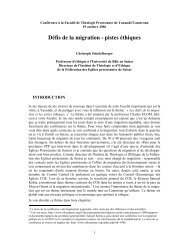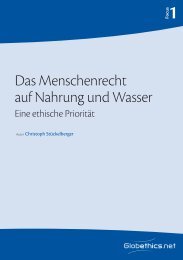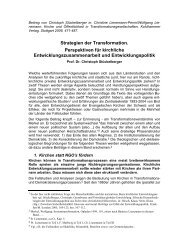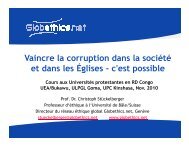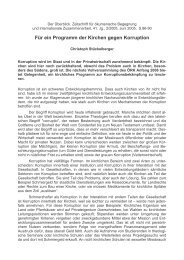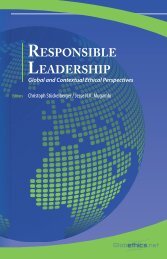BREAK THE CHAINS OF OPPRESION AND THE YOKE OF ...
BREAK THE CHAINS OF OPPRESION AND THE YOKE OF ...
BREAK THE CHAINS OF OPPRESION AND THE YOKE OF ...
Create successful ePaper yourself
Turn your PDF publications into a flip-book with our unique Google optimized e-Paper software.
Pov erty<br />
cial fears grow there also grows the tendency to dissociate oneself and exclude<br />
others. “Problem areas” are described in which those affected become unreachable.<br />
They are ever more seen as the cause of their own plight. The impression<br />
arises that one cannot do anything at all, and everything is only a drop in the<br />
ocean.<br />
Engagement against child poverty demands the courage to confront one’s own<br />
fear of poverty. This is also true for our congregations. It is also true in a figurative<br />
sense: Fear of the insignificance for society of our church life quickly leads to<br />
resignation in the face of socio-political challenges.<br />
By contrast effective help demands courage and the readiness to take risks. The<br />
Good Samaritan could only help the one who had fallen among thieves because<br />
he showed courage. He got down from his mount and entered the “area of risk”<br />
in which one must assume there were still other robbers. Tracking down such areas<br />
of risk in which involvement demands the courage to confront one’s own<br />
fears is a reliable direction-finder for the development of further effective projects<br />
against child poverty.<br />
Theological Approaches<br />
When the Evangelical Church of Westphalia now asks its congregations and<br />
church circles, works, associations and institutions to participate in a campaign<br />
against child poverty, it is not a question simply of a community or social welfare<br />
task. For the church it is the most elementary matter of faith.<br />
All church action is based on Jesus Christ’s command to missionize and baptize.<br />
A church which baptizes little children and in so doing receives them into the<br />
community of the faithful does not only take over responsibility for their religious<br />
upbringing �and �education. � She is also required � �to<br />
make participation in<br />
church and society possible for all, but particularly for the poor. With the heading<br />
“Option for the Poor” the Evangelical Church of Westphalia refers to central<br />
biblical traditions. In the Old Testament God’s proximity to the poor is constantly<br />
based on the primary experience of Israel, the liberation out of Egypt.<br />
Not only the Ten Commandments but also other social protective rights such as<br />
the care of the poor, of widows and orphans, of strangers are introduced or summarized<br />
by reference to this.<br />
In the New Testament Jesus Christ, the Son of God, was born in a stable and<br />
grew up while fleeing. His appearance and proclamation were interpreted as a<br />
fulfilment of Old Testament promises (Luke 4:18-21). In the Parable of the Last<br />
Judgement (Mt. 25:31-46) the hungry, thirsty, strangers, naked, the sick and<br />
prisoners were identified directly with Christ. Paul interprets his death on the<br />
Cross as a sign that God has chosen precisely what to the world seems of little<br />
importance, the weak (1 Cor 1:27f).<br />
�������������������������������������<br />
� � � � � � � �������������������<br />
�<br />
198<br />
– AGAINST CHILD POVERTY –



